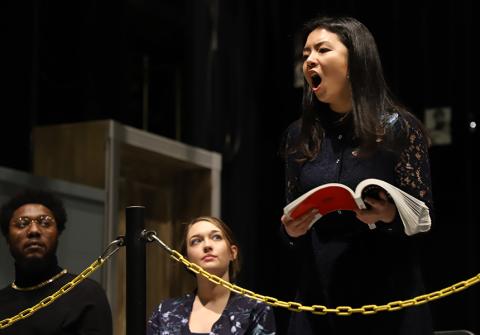Today’s Refugee Crises Reverberate in Menotti’s Opera 'The Consul'

Soprano Bizhou Chang (G.P.D. '20, opera) will play the role of Magda in Boston Conservatory’s upcoming production of The Consul, an opera written by Gian Carlo Menotti in response to the many stories of refugees fleeing Eastern Europe after World War II.
Photo Credit: Laura Pernas
“You’re not one of our people. You’re not our concern.” These lines, from Gian Carlo Menotti’s 1950 opera, The Consul, echo events from around the world that we read about every day, as asylum seekers are regularly denied refuge. In this scene of the opera, the cold, detached Secretary in Menotti’s consulate addresses Magda Sorel, who is desperate to join her husband, John, a rebel who has fled his home country and its totalitarian government’s violent secret police.
The Consul, which is being presented by Boston Conservatory at Berklee as part of the school’s Center Stage performance collection, rings as true to today’s political climate as it did nearly 70 years ago, when, tragically, a Polish immigrant hanged herself on Ellis Island after being denied entry to the United States—one of the heartbreaking stories that inspired Menotti to compose this Pulitzer Prize–winning work.
After World War II, accounts of European families fleeing oppression but failing to find safe havens elsewhere were rampant. In the United States, the early suspicion and xenophobia of the Cold War began to seep into daily interactions; Menotti himself, despite having been a legal resident of the United States since 1928, was labeled an “enemy alien” during World War II because of his Italian citizenship.
The unsettling relevance of The Consul is underscored by the fact that Menotti’s consulate isn’t set in a specific time or place—a statement about how oppression and bureaucratic tyranny are universal issues. At the opera’s consulate, where “your name is a number, your story’s a case, your need a request,” Magda encounters vestiges of other figures from Menotti’s life, from an elderly Italian woman hoping to join her gravely ill daughter, to Anna Gómez, a refugee with no place to call home after escaping the concentration camp where her husband remains prisoner. All are repeatedly dismissed by the Secretary, who informs them that “Your hopes will be filed. Come back next week.”
Soprano Bizhou Chang (G.P.D. '20, opera) and her colleague Josephyne Santos (M.M. '19, opera) are tackling the monumental role of Magda in Boston Conservatory’s upcoming production. A Chinese citizen, Chang herself is currently in the process of applying for a foreign artist visa that will allow her to work legally in the United States. Having lived in several different countries, she identifies with Magda’s experience in navigating a foreign system, but for her, the beauty of Magda’s character lies in the tremendous strength that emerges from her desperation, fueled by a fierce love for her family. Chang describes Magda as “a woman, a mother, a daughter, a wife, a victim, a freedom fighter,” a multifaceted individual whose story resonates across any number of societal divides.
Johnathon Pape, the opera’s director, also infuses his interpretation with a personal understanding of immigration bureaucracy from years of mentoring international students and his own year spent in the Czech Republic on a Fulbright fellowship. Although the production will be set traditionally in the mid-20th century, its timeliness is a constant presence. The set design features a “tribute grid” filled with pictures of immigrants, refugees, and asylum seekers across history, including the present day, as a reminder for the audience that Menotti’s story is far from a shadow of the distant past.
As an operatic work, The Consul has been criticized in some musical circles for excessive melodrama and lack of subtlety. However, Menotti suggests that subtlety is not an appropriate response to the subject matter at hand: “Timidity is fatal to an opera composer, for music intensifies feeling so quickly that, unless a situation is symbolically strong enough to bear this intensity, it becomes ludicrous by contrast."
Pape too affirms that the strength of Menotti’s work is in its unapologetic forcefulness, explaining, “This is polemic theater and doesn’t pretend to be something other than that.” As the arts serve to examine the human condition and draw attention to injustices, the unbridled emotional power of timeless works like The Consul help to remind us of our humanity, and the fundamental respect that is essential to our society’s growth and progress.
Boston Conservatory at Berklee will present The Consul from Thursday, March 28 through Sunday, March 31 at Boston Conservatory Theater. Learn more and purchase tickets.
